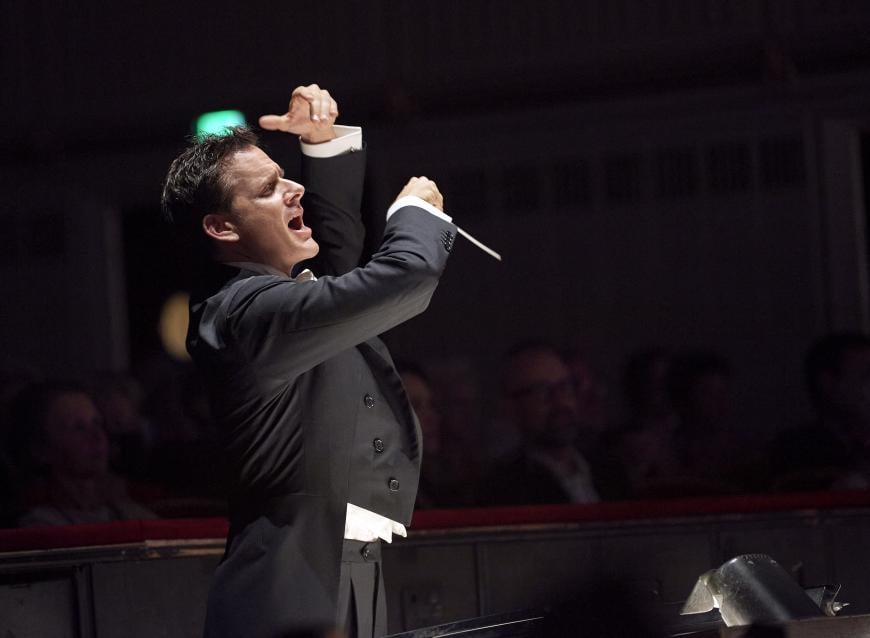San Francisco Symphony Delivers The Antiwar Message Of Britten’s Struggle Requiem

Philippe Jordan | Photo credit: Michael Poehn
Benjamin Britten’s War Requiem continues to send a powerful message long after it was first performed in 1961. The modernist masterpiece presents enormous challenges of scale, challenges embraced and conveyed by the San Francisco Symphony with guest conductor Philippe Jordan, the Silicon Valley-based Ragazzi Boys Chorus, soprano Jennifer Holloway, tenor Ian Bostridge and baritone Brian Mulligan, a Last minute replacement for Iain Paterson who was kept away due to visa issues.
The Requiem was commissioned to mark the rebuilding of Coventry Cathedral in England, which was destroyed along with the rest of the city in a bombing raid in 1940. Britten’s music, performed in the new cathedral next to the ruins of the old church, was then as now a bitter cry about what the text calls “the pity of war” – the terrible effects of aggression on human lives.
The Requiem sets the Latin text of the Catholic funeral mass to music, using a large orchestra with a correspondingly large choir and a soprano soloist. Far from the stage, a children’s choir echoes from the Latin Mass (in this case, from the corridor behind the second floor of Davies Hall). In Britten’s hands, the liturgy offers some moments of comfort, such as at a funeral, but moments of peace are often drowned out in horrifying apocalyptic scenarios.
Benjamin Britten rehearses his War Requiem in the rebuilt Coventry Cathedral
Britten’s masterpiece in crafting a requiem for the war-torn 20th century was to contrast the liturgical with a more personal, secular perspective. He drew on the poems of Wilfred Owen, who died in World War I just a week before the armistice. Britten, a master at setting English poetry to music, brings out the painful range of emotions of a soldier in the trenches – fear, sadness, longing and tenderness. Owen’s lyrics are performed by a smaller chamber orchestra playing in intimate counterpoint with the tenor and baritone soloists.
The Requiem was the only piece on the program that was performed without an intermission. Jordan directed these many forces with alert precision and control, keeping steady beat where needed, as in the wild fugue Britten wrote for the Latin text “Quam olim Abrahae promisti” (Which thou [God] once promised to Abraham). The orchestra was full of lively percussion – bells, drums and all sorts of clacks and gongs. The brass made a tremendous contribution with bugle calls and ominous trumpets. As the choir sang Judgment Day, the orchestra murmured and swayed in powerful counterpoint to the terrified voices. The chorus skillfully handled Britten’s extraordinarily wide dynamic range – from the softest whisper to the loudest screech. Guest choir director Joshua Habermann prepared the symphony choir.
Britten counterpoints God’s promise of protection at the hour of death and on the day of judgment with Owen’s poem about Abraham and Isaac, sung by the baritone and tenor soloists. Abraham is commanded to sacrifice his son Isaac, and he dutifully prepares. In the biblical account, the command is revoked by an angel who offers a ram in place of the boy. In a tender duet, the two soloists expressed the angel’s intervention in a moving way. But Owen writes: “The old man would not do that, but killed his son. . .” and the music follows with a relentless reiteration of the gruesome consequences: “. . . and half the seed of Europe, one at a time.”
Ian Bostridge | Photo credit: Kalpesh Lathigra
Brian Mulligan’s confident, full baritone accentuated Owen’s tone of hopelessness and regret, particularly in the work’s moving final episode, in which a dead German soldier meets his English enemy and greets him as ‘my friend’. By contrast, Ian Bostridge tended to emphasize the irony of war, his notes devoid of sentimentality and seeming suffused with pain, swaying up and down the scale with manic glissandi. I will not soon forget Bostridge’s powerful rendition of ‘Move him into the sun’, Owen’s Pietà for a Dead Friend. The chamber orchestra contributed lively soundscapes of trench warfare – the howling of shells and the anxious drama of life in the trenches.
The powerful clarity of soprano Jennifer Mulligan brought a soulful tension to the Latin liturgy – there is no superficial religiosity here! Her proclamation of Sanctus – “Holy” – pierced the din of drums and bells like a beam of light across a dark battlefield.
The guys from the Ragazzi Chorus were excellently prepared by their artistic director Kent Jue and sang beautifully, spatially and musically far removed from the dark imaginations and struggles of the people in the war.
On opening night, when I heard the Requiem, there were a few glitches in the early sections – the orchestra was not as rhythmically tight as it could have been, the choir trembled at the Kyrie’s very difficult intonations. It took some time for Mulligan to find his consonants and for Bostridge to stop singing into his score. But as soon as the play really got going, the insecurities of the first evening disappeared.
The rest was magnificent, a complex and deeply human indictment of aggression and military force that is still—or perhaps increasingly—needed in these times.



:no_upscale()/cdn.vox-cdn.com/uploads/chorus_image/image/72576202/1636205731.0.jpg)

